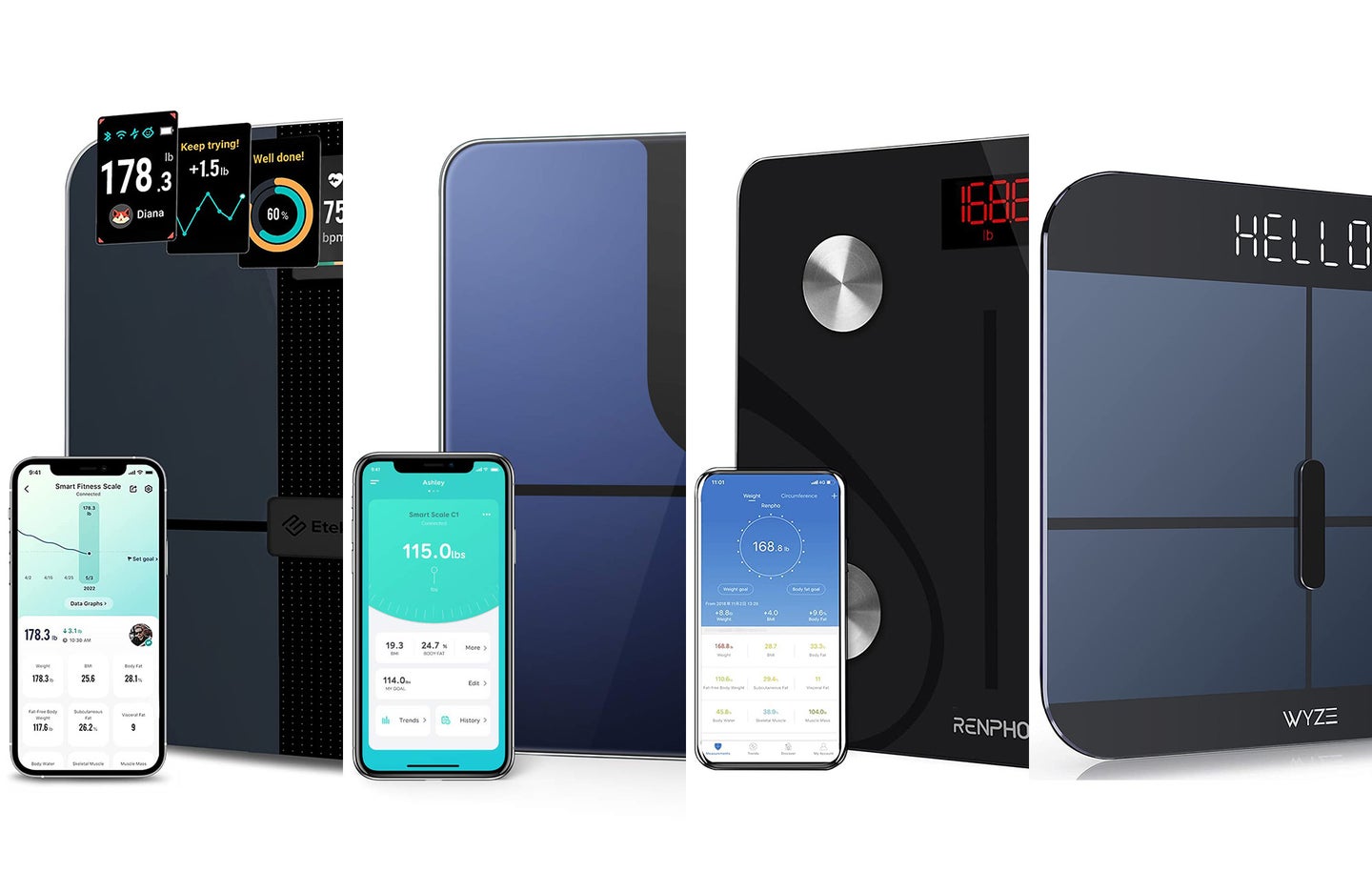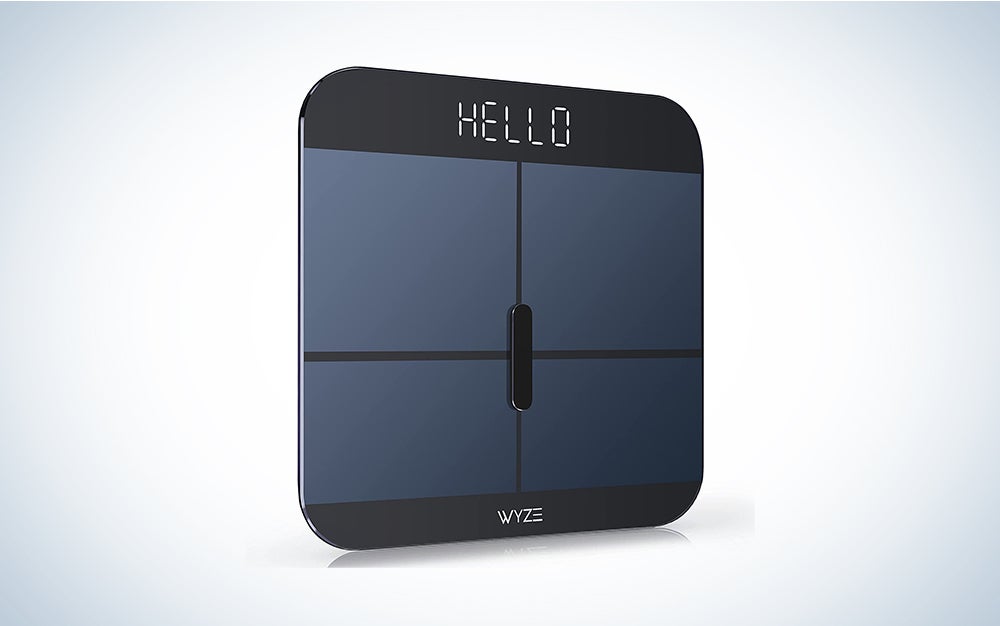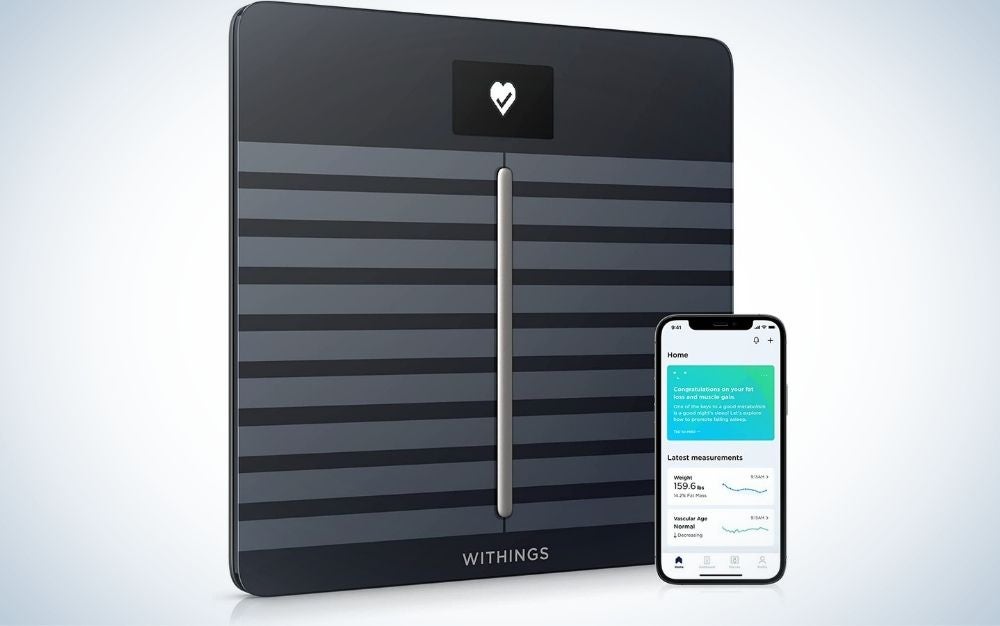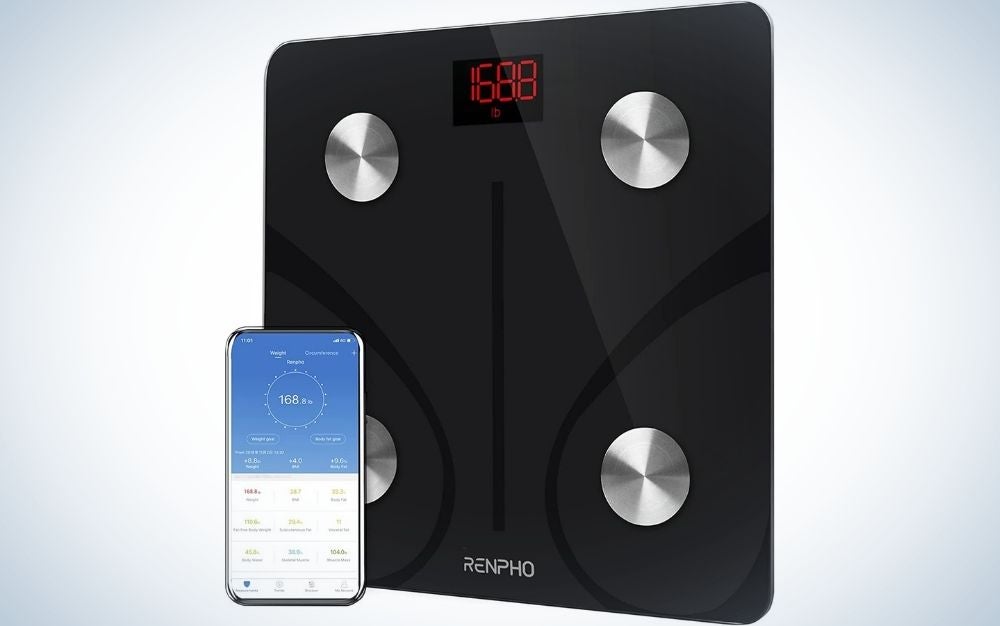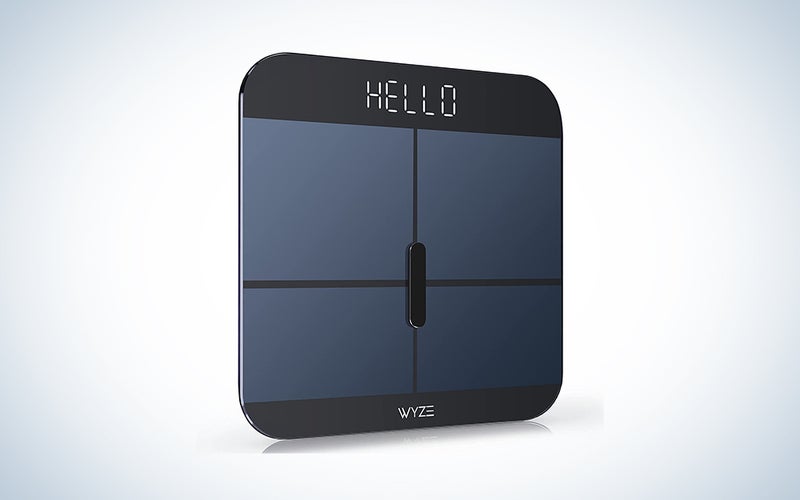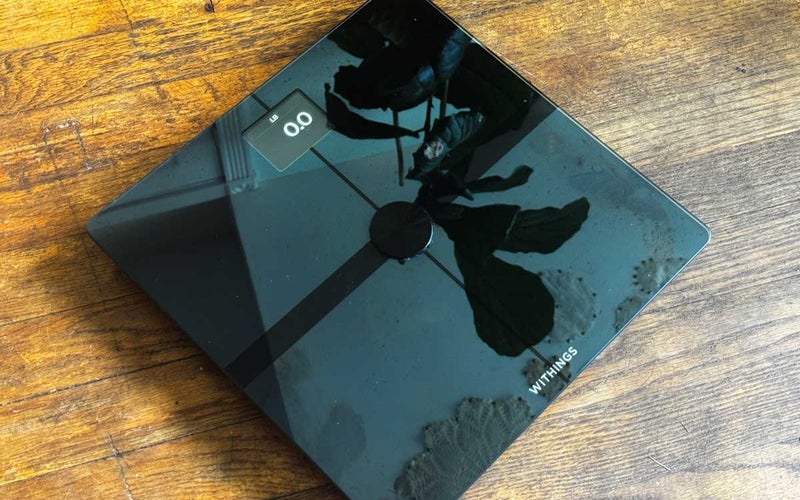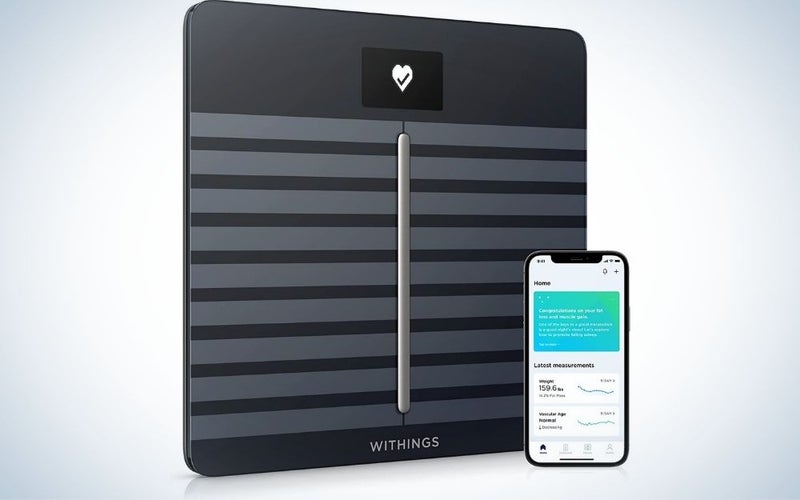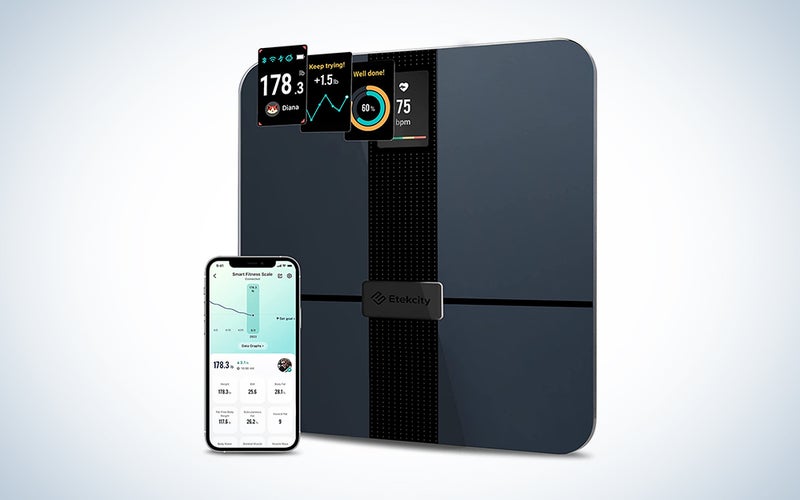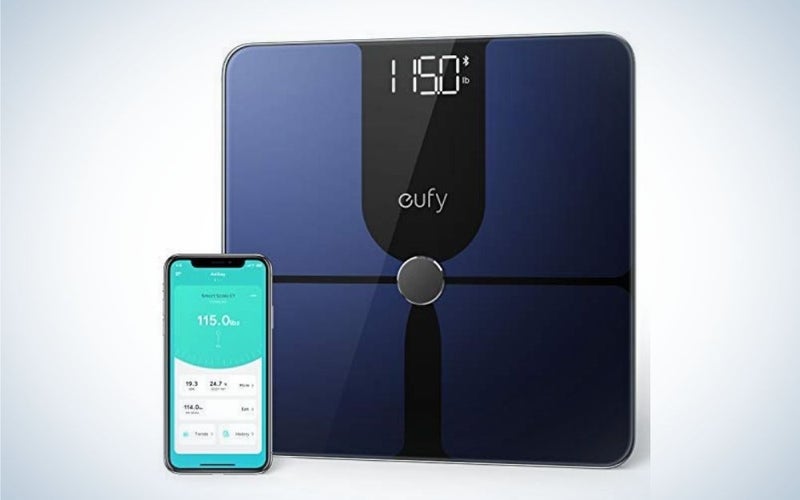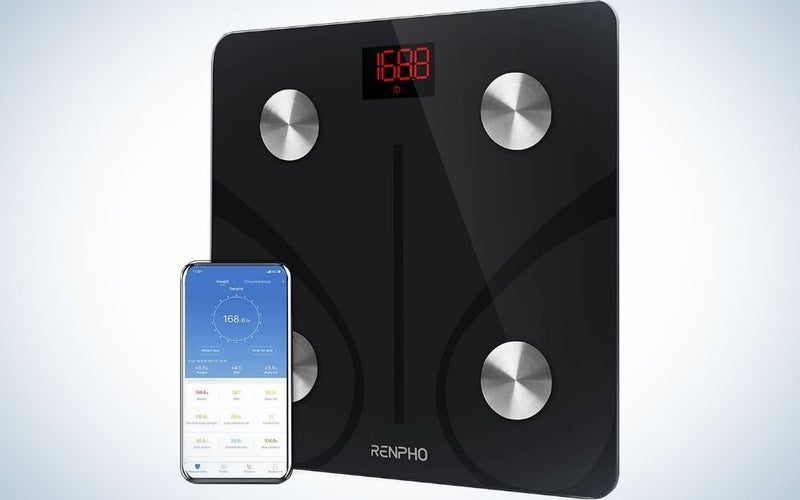We may earn revenue from the products available on this page and participate in affiliate programs. Learn more ›
Any scale can measure your weight, but the best smart scales do much more. Most measure various other metrics, including muscle mass, body fat, and heart rate. Although the number on the scale is just a number, keeping these metrics in mind can help you make healthy changes—if your heart rate is a little low, you can get it pumping by taking the steps when coming back from your coffee run, for example. They can also help you and others in your home monitor changes and track your progress over time. The best smart scales are a step up from what you find in your grandma’s bathroom with valuable info to live a more active life.
- Best overall: WYZE Smart Scale X
- Best for fitness: Withings Body Smart
- Best apps: Withings Body Cardio Smart Scale
- Best high-capacity/pregnancy mode: Etekcity Apex Smart Scale
- Best for multiple users: Eufy by Anker Smart Scale P1
- Best budget: Renpho Body Fat Scale
How we chose the best smart scales
As a freelance journalist for over 10 years, I’ve reviewed technology for publications including CNN Underscored, Popular Mechanics, Tom’s Guide, The Daily Beast, Architectural Digest, Apartment Therapy, The Spruce, and Bob Vila. I tested every scale save one on this list, and the rest of the selections are based on extensive research, recommendations from fellow tech colleagues, and reviews from other users.
The best smart scales: Reviews & Recommendations
Some of these smart scales are Bluetooth-compatible and sync with an app. Some are packed with profiles and metrics for ultra-customizability for everyone in the family. Some connect to your WiFi and integrate into a connected smart-home system, communicating wirelessly with other devices. One of our choices should be a welcome addition to your bathroom.
Best overall: WYZE Smart Scale X
WYZE
Why it made the cut: Weigh in on weight, BMI, muscle percentage, body fat percentage, and so much more, with a scale that easily syncs with the WYZE app on your smartphone; we think that’s pretty powerful stuff.
Specs
- Connectivity: Bluetooth
- Individual profiles: 8
- Weight capacity: 400 pounds
- Metrics: 13
Pros
- Measures lots of different health metrics
- Attractive tempered glass design
- Easily syncs with some smartphone apps
Cons
- Somewhat invasive software wants to track your location
- Doesn’t actually pair with all 3rd party apps
What if your scale and smartphone actually talked to each other? Well, with the WYZE Smart Scale X, they do. This attractive bathroom scale uses ITO electrode coatings with tempered glass to read all sorts of health metrics and then pairs with your health app on your smartphone app to ensure you keep abreast of the updates.
The Smart Scale X is no simple scale; it tracks weight, muscle mass, body-fat percentage, BMI, heart rate, body water percentage, and so much more. This info is then updated in the Wyze app or other health apps like Apple Health, Google Fit, and Fitbit. This ensures you can keep accurate tabs on your health as you run marathons and measure the progress on your Scale X when you get home.
This device capitalizes on connectivity; however, this connectivity is also its only real downside. After connecting to your phone, WYZE asks for constant access to your location data, which we think is a slight overreach. You can opt out, but it will keep asking. This may or may not be an issue for you and likely doesn’t go far beyond the health data your phone is already tracking.
Otherwise, we think the WYZE Smart Scale X is indeed a smart purchase, giving most users a ton of useful info to help them track their health.
Best for fitness: Withings Body Smart
Stan Horaczek
Specs
- Connectivity: Bluetooth or WiFi
- Individual profiles: 8 users
- Weight capacity: 440 pounds
- Metrics: 10
Pros
- Eyes Closed mode hides your weight to prevent obsessing while still tracking progress
- Accurate to 0.1 pounds
- Tracks key metrics
- Advanced app features
- App goes beyond data tracking and makes recommendations
- Attractive
Cons
- A bit pricey
- Glass surface attracts grime
Daily weigh-ins can provide a looming sense of dread when trying to improve your overall health. Withings equipped this smart scale with an Eyes Closed mode, which tracks your weight but replaces the number on the screen with a motivational message. You can, of course, still access that information thorough the Withings app, which will track your progress as you go. But, you’re not confronted with that number every day, which can be a big bonus for some people. I was skeptical myself before I tried it, but I actually appreciate the option. It helps encourage through tracking without having to face the music for spending a night out enjoying yourself.
Whether you keep your eyes open or closed, this scale is a full-featured model that justifies its somewhat high price. It’s accurate to 0.1 pounds, provides a ton of useful metrics, and is attractive to look at (as long as you wipe the grime off of the shiny surface fairly regularly).
You can track body fat, water percentage, muscle mass, bone mass and lean mass, as well as more complicated compound numbers like Visceral Fat Index, and BMR (Basal Metabolic Rate). I like Withing’s ability to tweak your specific tracking preferences so you can be as granular or laid back as you want. Overall, this is a solid option that will let you dive into your health metrics without stressing you out.
Best with app: Withings Body Cardio Smart Scale
Withings
Why it made the cut: The Withings Body Cardio Smart Scale is compatible with over 100 apps.
Specs
- Connectivity: Bluetooth or WiFi
- Individual profiles: 8 users
- Weight capacity: 396 pounds
- Metrics: 10
Pros
- USB charging cable
- Can be used with babies
- Shows vascular age
- Includes weather forecast
- Can be used on hard floors and carpet
Cons
- Really expensive
- Can’t turn off BIA
The Withings Body Cardio is by far the most expensive smart scale on the list, which is the only reason it isn’t our overall best pick. However, it’s jam-packed with features. The scale shows stats on your phone, but you can also see them on the scale’s display. Most scales only show a few stats on the actual screen and send you to the app on your phone to see the others. The scale shows your weight, BMI, heart rate, vascular age, muscle mass, percentage of body fat, percentage of body water, bone mass … even your baby’s weight, and the current and daily high temperature in case you plan on going outside. The vascular age measurement can help you see how your cardiovascular health compares to the norm for your age bracket.
Withings invented the first smart scale and has a lot of experience in this category. The Withing Body Cardio is also compatible with over 100 health apps, including Fitbit, Apple Health, and Google Fit. Since it uses a USB charging cable, you won’t have to worry about swapping in fresh batteries. If price is a barrier, check out the company’s Withings Body+ scale, which is less than $100.
If standing heart rate and vascular age aren’t metrics you’re looking for in a smart scale, the Body+ scale is for you. It includes all other metrics—including BMI, fat mass, and water percentage—along with the same modes and number of user profiles as the Body Cardio scale.

Best high-capacity/pregnancy mode: Etekcity Apex Smart Scale
Etekcity
Why it made the cut: The Etekcity Smart Scale has a high weight capacity and also includes separate modes for both pregnant mothers and newborn babies.
Specs
- Connectivity: WiFi
- Individual Profiles: Unlimited
- Weight capacity: 400 pounds
- Metrics: 14
Pros
- Pregnancy mode
- Baby mode
- 400-pound weight limit
- USB charging cable
Cons
- Expensive
The Etekcity Apex Smart Wi-Fi Body Fat Scale is the best smart scale for pregnant women since it has a Zero-Current Mode. In addition, the scale has a Baby mode for measuring babies. Its 400-pound capacity is also as high as you’ll find on the list.
There are no batteries needed—the scale uses a USB charging cable. It tracks 14 measurements, including weight, BMI, body fat, protein, muscle mass, visceral fat, BMR, heart rate, subcutaneous fat, bone mass, body water, metabolic age, skeletal muscle, and fat-free body weight. The smart scale uses the VeSync app, and can also use Apple Health, Google Fit, Fitbit, MyFitness Pal, and Samsung Health.
Best for multiple users: Eufy by Anker Smart Scale P1
eufy
Why it made the cut: The Eufy by Anker Smart Scale P1 is easy to use, making it ideal for everyone to use.
Specs
- Connectivity: Bluetooth
- Individual profiles: 16
- Weight capacity: 396 pounds
- Metrics: 14
Pros
- Excellent value for price
- Auto-calibrating sensors
- 14 measurements
- Easy to connect
Cons
- Can’t use if pregnant or wearing a pacemaker
The Eufy by Anker Smart Scale P1 can be used to create up to 16 individual profiles. Although there are smart scales that allow for an unlimited number of users, we think this is best for multiple users for other reasons. For example, the scale uses G-shaped auto-calibrating sensors, which can help to increase accuracy. The only thing worse than your measurements being off is the entire group’s measurements being off—and it’s hard to motivate a group to continue making progress when it’s not even clear that they are making progress.
The scale draws power from 3 AAA batteries, and it’s easy to connect the scale to the Eufy app. Also, 14 different measurements are provided: weight, body fat percentage, BMI, body fat mass, lean body mass, protein, BMR, visceral fat, muscle, muscle mass, bone, body age, bone mass, and water. The scale can be integrated with various third-party apps, including Google Fit, Fitbit, and Apple Health.
Best budget: Renpho Body Fat Smart Scale
RENPHO
Why it made the cut: The Renpho Body Fat Smart Scale measures a variety of body fat indicators and can be seamlessly integrated with other apps—all for less than $30.
Specs
- Connectivity: Bluetooth
- Individual profiles: Unlimited
- Weight capacity: 396 pounds
- Metrics: 13
Pros
- Excellent price
- Accurate measurements
- Plenty of metrics
- Works with numerous apps
Cons
- Should not be used on carpet
The Renpho Body Fat Smart Scale can detect 13 body composition stats: weight, BMI, body fat, subcutaneous fat, visceral fat, body water, skeletal muscle, muscle mass, bone mass, protein, metabolic age, BMR, and fat-free body weight. It’s easy to use and track the various metrics, and there’s also an athlete mode. The scale can be used with various fitness apps, including Samsung Health, Fitbit, Apple Health, and Google Fit.
This is one of the most popular smart scales due to its combination of price and features. It accommodates unlimited users, so everyone in your family or group can use the same Renpho App to track and share progress. The scale is quite accurate and uses batteries instead of a USB charging cable.
What to consider when buying the best smart scales
It’s important to weigh your options when deciding between the smart scales on the market. There are several factors to consider:
Metrics measured
Smart scales measure various metrics, including bone mass and body fat percentage, but some measure more indicators than others. For example, one smart scale on our list measures 10 metrics, while another offers 14. We list all of these for each smart scale so you can determine which metrics are important to you and avoid paying for features you’ll never use.
Bluetooth or WiFi
All smart scales use Bluetooth or WiFi for wireless connectivity, and some use both. WiFi is much more convenient since Bluetooth has a specific range and is more likely to drop periodically. However, solely Bluetooth-enabled scales are likely to cost less.
Syncing
Some smart scales can sync with fitness apps and trackers to provide even more functionality, including the ability to review all of the results from both the scale and app in one place. However, some people may consider that information overload and decide that syncing with the smart scale’s app is sufficient.
Multiple users
If there’s more than one person in your household—or if you’re in a fitness group sharing the same scale—you’ll want a smart scale that can track individual results for multiple people. Some scales allow for eight or even 16 individual users, whereas other smart scales allow unlimited users to create personal profiles. If you’re using the scale in a group setting, unlimited users will probably be more important to you. However, be advised that multiple users will all use the same account, so they can view your personal information.
Pregnancy mode
Smart scales use bioelectrical impedance analysis (BIA) technology to provide biometric measurements. However, for expecting mothers, this can be problematic. So, if you’re pregnant, you’ll want a smart scale that will allow you to turn this feature off in the smart scale’s app, instead of opting for Zero-Current Mode. Also, if you’re wearing a pacemaker, you’ll want a smart scale that can turn it off.
Batteries vs. USB
Some smart scales run on batteries, while others can be charged with a USB cable. And some can do both. On one hand, avoiding disposable batteries is good for the environment, but on the other hand, batteries don’t use electricity. This decision will come down to personal preference (so perhaps consider rechargeable batteries and/or recycling used batteries properly).
FAQs
Q: How much does a smart scale cost?
Depending on features, a smart scale can start at $25 and go up to $180.
Q: Which brand is most accurate?
Withings is considered the most accurate brand, although all of the scales on our list are generally accurate. It’s also important to remember that, sometimes, a seemingly inaccurate reading could result from user error. Always weigh yourself at the same time daily—the start of the day is best since you haven’t eaten yet. Also, put the scale on a flat surface.
Q: What about my privacy?
To provide the most accurate information, smart scales typically collect a lot of information. In addition to biometric measurements, they may also collect your age, sex, height, name, and contact information. Syncing to third-party apps adds another level of information sharing. Companies may or may not sell your information—and they may be subject to data breaches, exposing your personal info to hackers.
Q: Are mechanical scales better than digital?
Analog scales are certainly easier to operate, and they’re also considered more durable since the sensors in digital scales can wear out over time. However, digital scales provide so many more features. For starters, the digital readout is easier to read. It also eliminates guesswork and provides more accuracy (for example, 137.8 pounds vs. 137 or 138 pounds). Digital scales can also provide other measurements, such as body mass index, bone mass, and body water. They’re also compatible with fitness apps. In addition, they can track different users separately.
Final thoughts on the best smart scales
- Best overall: WYZE Smart Scale X
- Best for fitness: Withings Body Smart
- Best apps: Withings Body Cardio Smart Scale
- Best high-capacity/pregnancy mode: Etekcity Apex Smart Scale
- Best for multiple users: Eufy by Anker Smart Scale P1
- Best budget: Renpho Body Fat Scale
A smart scale can help you take control of your fitness routine by allowing you to track various measurements. Historical records allow you to gauge your progress toward reaching fitness goals. Also, adding multiple users lets everyone have an individual profile containing their own data.
When weighing both price and features, the Wyze Smart Scale is the best overall choice. However, if you’re willing to splurge, the Withings Body Cardio Smart Scale displays its 10 metrics without needing to view your phone. It also measures the most popular indicators—such as BMI, heart rate, muscle mass, body water, and bone mass—and even measures vascular age and includes the weather forecast. However, the best smart scale for you will be determined by your individual needs and budget.
Why trust us
Popular Science started writing about technology more than 150 years ago. There was no such thing as “gadget writing” when we published our first issue in 1872, but if there was, our mission to demystify the world of innovation for everyday readers means we would have been all over it. Here in the present, PopSci is fully committed to helping readers navigate the increasingly intimidating array of devices on the market right now.
Our writers and editors have combined decades of experience covering and reviewing consumer electronics. We each have our own obsessive specialties—from high-end audio to video games to cameras and beyond—but when we’re reviewing devices outside of our immediate wheelhouses, we do our best to seek out trustworthy voices and opinions to help guide people to the very best recommendations. We know we don’t know everything, but we’re excited to live through the analysis paralysis that internet shopping can spur so readers don’t have to.
